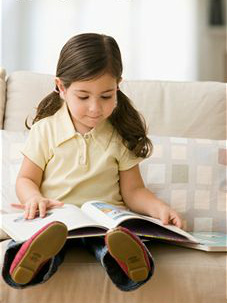 Reading is perhaps the primary skill that is needed for a good education, as much of learning is based on the ability to read. As parents and teachers we should do our best to expand our children’s thinking processes and help them to communicate their feelings and ideas. Children who grow up in an environment where a variety of reading materials are made available are more likely to develop a greater interest in reading than if they do not have that input. They will also progress more quickly if they have been read to from an early age. Simple books that are of special interest to children can also help them to begin to learn to read, by encouraging them to point out any words they begin to recognize. A cardinal rule in teaching a child to read is for the parent (or teacher) to approach it as a fun, joyous, and happy time to be together. When teaching reading, a parent should never forget these things: * Learning is life’s most exciting game; it is not work. * Learning is a reward; it is not a punishment. * Learning is a pleasure; it is not a chore. * Learning is a privilege; it is not denial. Children differ in how they progress in reading, but one thing remains constant: Your personal interest and attention as the parent or teacher can make all the difference. Almost any approach you take to teaching reading will succeed if your child is happy, motivated, interested, and enjoys the experience. Many people believe that young children may not have the attention span required to learn to read. However, if your times of learning are active and not drawn out, you may find out that the opposite is true, and your children will associate learning to read with enjoyment, which will help keep their interest, and will increase their desire to learn. Young children are much less awed by reading than older children, and do not consider it a subject full of frightening abstracts; instead, they view it as another exciting thing to learn. One key to success is to make sure your children know they are making progress. When they are praised for their accomplishments, children are then motivated to continue learning. Beginning to read can be particularly fun for small children as they start to see all the new words they are able to recognize and read on their own. At the end of a reading session, a simple review of new words encountered, a liberal application of praise for progress made, a sneak peek at what they have to look forward to next time, and an affectionate commendation in a hug—all these are great motivators for most children. Our brain is like a computer; it receives extensive information on a daily basis, and the more it receives, the greater its capacity to receive becomes. Teaching reading during the one to five age bracket is very effective. Young children are linguistic geniuses, and by the age of five they have usually learned one language (or even two or three), sports, simple mathematics, basic writing skills, and much more. Their ability to learn is at its peak, and they have the potential to learn more quickly than they would at a later stage of their lives. Young children can learn almost anything at an early age if it is presented in a clear, informative, and factual manner. Realizing that makes us aware of the great potential in children, and also the great responsibility of teaching a child. Dos of reading: * Be joyous! Love teaching the children that you are with. * Reward a child for success by lavishing praise on the child. * Be enthusiastic. * Eliminate possible distractions. Be sure that you have the child’s full attention. * When teaching children to read, it’s important that they learn to read from left to right. Use your finger or a pencil, and move it under the words to guide their eyes from left to right. Don’ts of reading: * Don’t bore the child by going too slow. * Don’t test the child. * Don’t continue a session if the child loses interest. * Don’t pressure a child to learn. Click here for free readers for young children! By Derek and Michelle Brookes, compiled from Early Bird Readers—A Teacher and Parent’s Handbook
0 Comments
Leave a Reply. |
Categories
All
Archives
March 2024
LinksFree Children's Stories |

 RSS Feed
RSS Feed
